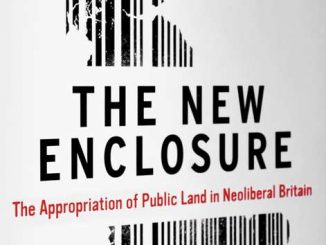Book Review by Andrew Purves
This is a short, informative and journalistic study of London’s housing crisis. It describes the effect of high housing costs – both to buy and rent, and gives many case studies to illustrate how people are living with the problem. It also gives a number of examples of small scale, local responses to the crisis, which although they go nowhere in terms of solving the underlying problem, nonetheless have had some impact on those most affected by the high cost of living in the Capital.
Some of the causes are described, such as overseas investment in London property, financialisation (a horrible word, but broadly the process whereby rental streams have been turned into interest payments to the finance sector) and a planning system which has been overrun by developers and their consultants, to the extent that local authorities are constantly on the back foot in terms of delivering sufficient affordable housing. However, the book fails to tackle the fundamental issue of our UK obsession with property as a means to store and accumulate wealth. Ever since the enclosure movement, and John Locke’s justification for property ownership, the Anglo Saxon model has assumed that it is only natural for people to seek to acquire and hand down property to the next generation. This is described by Andro Linklater in his book: Owning the Earth: The Transforming History of Land Ownership, which Anna Minton could be well advised to read. We are so used to the idea of property inheritance, that the majority of the population is now complicit in the system which perpetuates so much of our inequality, that it is an awkward subject to expose.
Given the uneasy peace that has prevailed in Europe since the Second World War, there has been no imperative to reset the system in order to reward the returning heroes, as happened after 1918, and more obviously in 1945. The social contract established by progressive economist William Beveridge and others following World War II, has been eroded by forty years of an ideology offering no alternative, that was meant to create a property owning democracy, where all would benefit from endless economic growth.
The reality is that property owners benefit disproportionally, and the more barriers that are removed to accumulation (think the creation of buy to let mortgages available to those with existing assets), and incentives created (think tax breaks on interest payments) the greater the wealth flowing to those with all the advantages in life.
Local authorities themselves are pilloried for their apparent complicity in engineering the worst outcomes for Londoners, although it seems that their hands are often tied. Unable to deliver large scale public housing schemes typical of the post war period, they are forced into diabolical partnerships to avoid the high cost of refurbishment, and make do with the scraps leftover from viability assessments which reduce the provision of affordable housing to the least possible consistent with gaining the permission to develop new luxury flats.
However, the list of potential solutions (except local campaigning), which might have an impact in specific cases, are confined to one or two paragraphs in the final chapter, and would rely on the reader doing more work to understand the issues fully. These include a mechanism to capture a part of the land value uplift for public revenue, which has the potential to deflate the ever rising cost of housing, and shift the incidence of taxation from employment and consumption onto real wealth.
Big Capital, therefore can only be seen as an introduction to the debate on how to provide such an essential need to the citizens of the UK.
Andrew Purves is a guest author. He runs a furniture business, is taking a Masters in Spatial Planning at UCL, and has written about the public revenue regime in Hong Kong.
Big Capital – who is London for? By Anna Minton
Published by Penguin Books
https://www.penguin.co.uk/books/303684/big-capital/
ISBN: 978-0141984995





Be the first to comment